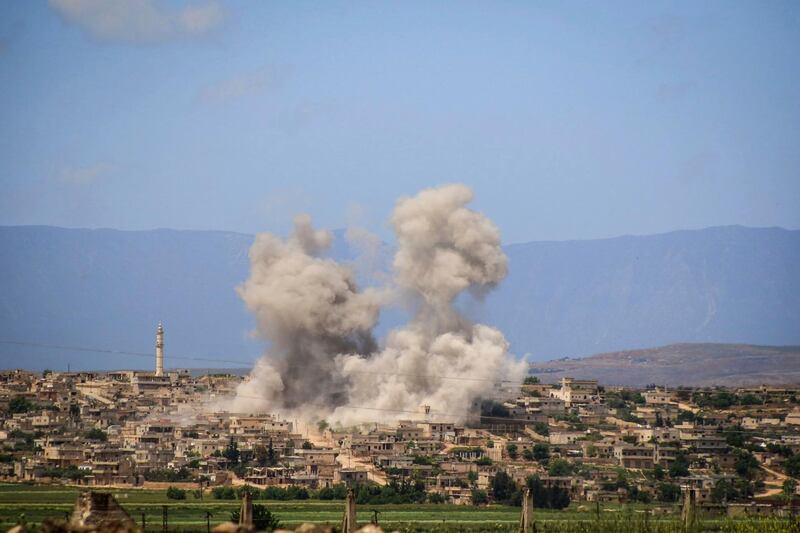The assault on Idlib province, mainly by Russian and Syrian regime forces, is a vast atrocity unfolding before the eyes of an uncaring world. Compared to their entirely appropriate condemnations of Iran, Hezbollah and the Assad regime, Arab nations have also had less to say about Russia’s actions.
Three million civilians are cowering in Idlib, braced for the worst.
One million – yes, one million – of them are children, many sent there during the course of the war to avoid fighting, or in agreed-upon transfers of civilians to facilitate the withdrawal of rebel forces from insurgent areas that could expect no mercy from Bashar Al Assad’s merciless enforcers.
There are several reasons for the international indifference. Some are rational, but none make any moral sense.
First, the Assad regime has won the war in general, so the ultimate outcome isn't in doubt and Idlib doesn't matter to that.
Second, among the rebel groups in Idlib are Al Qaeda affiliates and other extremists. No one wants to support them, obviously.
Third, Turkey's main concern now seems to be that large numbers of Syrian refugees could spill across the border, in addition to the hundreds of thousands already there. Recent attacks on schools and hospitals – favourite targets of the regime and its backers throughout the war – reinforce such fears.
The rest of the world basically sees this as Turkey’s problem. But, in fact, Turkey’s refusal to accept more Syrian refugees and the closure of its borders means that the humanitarian cost of this assault could, as former United Nations secretary general Ban Ki-moon warned, be worse than the rest of this horrific conflict.
The slow process of the Arab reintegration of the Assad regime is already under way. And, indeed, there is now no realistic way to secure any interests in Syria other than by dealing with the regime and its main backer, Moscow.
Yet the international silence on the looming catastrophe in Idlib is not justifiable.
The Assad regime is, at least, on notice that the Arab world is outraged, especially given that the regime has not been allowed to represent Syria at the Arab League for years. Even if that changes in the future, the point was made.
Iran and Hezbollah are, of course, held responsible by many Arabs for much of the regional chaos and carnage their policies cause, including in Syria. But, for some reason, Russia has been given a relative pass.
One is hard pressed to recall major Arab statements that confront Moscow with the responsibility for its abuses in Syria. Combined with almost no American efforts to deter Russia from assaults in places such as Idlib, which lies far from areas of US influence, Moscow faces no real consequences for its conduct and appears duly emboldened by this lack of cost or criticism.
It’s understandable that many Arabs want to have close relations with Russia. In many ways, it and China serve as potential alternatives to the United States.
Crucially, Moscow can be deployed as leverage to secure Washington’s co-operation – as when Saudi Arabia got the US to facilitate its efforts to buy the THAAD missile defence system, after years of dawdling, by expressing interest in Russia’s S-400 system.
Besides, having overseen the regime’s victory in Syria, Moscow looks like a winner, a steadfast ally when it chooses to be, and an up-and-coming power within the region, in contrast to the US’s failures, flip-flops and gradual disengagement in the Middle East.
But this is largely, if not entirely illusory. Russia cannot begin to compare with the US in terms of power capability in the region, even if Washington is choosing to ostensibly sit out conflicts such as the one in Syria.
More importantly, it is high time to judge Russia on the nature and the impact of its policies in the region. It is no longer tenable to hold that the Assad regime is appalling and that the Syrian war is Exhibit A or B in the list of Iran’s brutal and destructive meddling in the Arab world while largely ignoring the vital role Russia has played in the Syrian conflict.
There are important efforts to try to woo Mr Assad into some kind of arrangement that could freeze Iran out of much of the post-war advantage in Syria. Hopefully, they will succeed.
For now, though, Moscow and Tehran seem deeply aligned, while the Assad regime prepares for what threatens to be the very worst phase of the war for innocent Syrians. Even if that cannot be stopped, at least let us recognise Russia’s role as an author of these crimes.
Hussein Ibish is a senior resident scholar at the Arab Gulf States Institute in Washington





